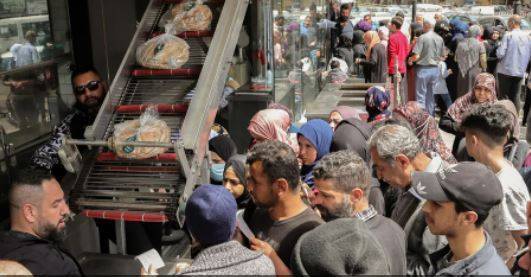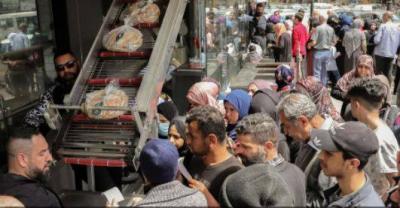The newspaper "Asharq Al-Awsat" reported that recent efforts successfully averted a bread crisis in Lebanon due to the non-payment for imported wheat by the central bank. An exceptional and partial decision was made to withdraw $15 million from Lebanon's special drawing accounts at the International Monetary Fund to secure the market's urgent wheat needs. Minister of Economy Amin Salam confirmed yesterday that there is "no decision from the state to lift subsidies on flour," emphasizing the importance of controlling the price of a loaf of bread.
Lebanese citizens had to search multiple bakeries for bread the day before yesterday (Monday) after the flour supply was cut, leading to a shortage of bread and forcing residents to seek other types of bread still available in markets. The crisis began last week when some mills closed due to a depletion of subsidized flour. The "Union of Mill Owners" mentioned that "the Central Bank of Lebanon" delayed securing payment for the subsidized wheat and the release of laboratory analysis results for the wheat, which further delayed bread production. The "Central Bank of Lebanon" provides hard currency for wheat imports, which remains the only food product still subsidized by the Lebanese state at the official exchange rate of 1,500 pounds to the dollar. Importers submit invoices for the value of imported shipments to the "Central Bank," which provides the bank guarantees for them.
Ahmad Haytiet, President of the Mill Owners’ Association, told "Asharq Al-Awsat" yesterday (Tuesday) that "the crisis was resolved after efforts made by Parliament Speaker Nabih Berri, in collaboration with Prime Minister Najib Mikati, to secure the necessary credits for wheat. Practical steps began yesterday by transferring the required amount from the central bank to unload two ships of wheat, with a similar action planned for today (Wednesday) and tomorrow (Thursday) to bring the total number of ships to six at a cost of $15 million." He noted that with this "solution, the needs of the Lebanese market are secured, with the existing stock, for one month." Regarding the situation after a month, Haytiet lamented, "Unfortunately, we now live day by day as all solutions have become partial due to the connection of the problem to payment in U.S. dollars and the credits linked to the Central Bank."
Agriculture Minister Abbas Al-Hajj Hassan stated in a radio interview that "it is expected, after the efforts made, for the Central Bank of Lebanon to open credits for wheat today (yesterday) so that the ships carrying the material can enter in batches to the Port of Beirut, gradually returning things to normal." He denied that the central bank had opened credits under a temporary loan agreement with the government and refuted any intention to lift subsidies on flour, stressing that "no one wants to lift the subsidy, at least in the foreseeable future."
General Labor Union President Bashar Asmar confirmed in a statement that "the country is currently experiencing a severe bread crisis resulting from the Central Bank of Lebanon stopping payment for imported wheat ships amid the absence of a strategic stock of this material. The crisis intensifies day by day amid the lack of radical solutions, affecting all segments of the Lebanese population, especially workers, the poor, and those with limited income. It is noteworthy that the Council of Ministers decided in its last session to allocate $15 million to support and secure the country’s wheat needs, but the Central Bank has not yet paid, which exacerbated matters and contributed to the cessation of many mills from producing subsidized flour for Arabic bread."
The President of the "Union of Bakery Owners" in Lebanon, Riyad Al-Sayyid, announced in a statement the day before yesterday that "the bakeries no longer have quantities of flour to continue producing bread due to the non-payment for imported wheat by the central bank," confirming that the closure of bakeries suffering from significant difficulties and problems will affect large bakeries spread across all Lebanese territory, describing the situation as "moving from bad to worse after the loss of flour." He called on all responsible individuals to work on finding a suitable solution to secure the material as quickly as possible.
Since the Beirut port explosion, which destroyed the country’s grain silos, the "Central Bank" has been providing dollars for wheat imports, adding quantities to the mills' stocks periodically to suffice the market for about a month and a half.




